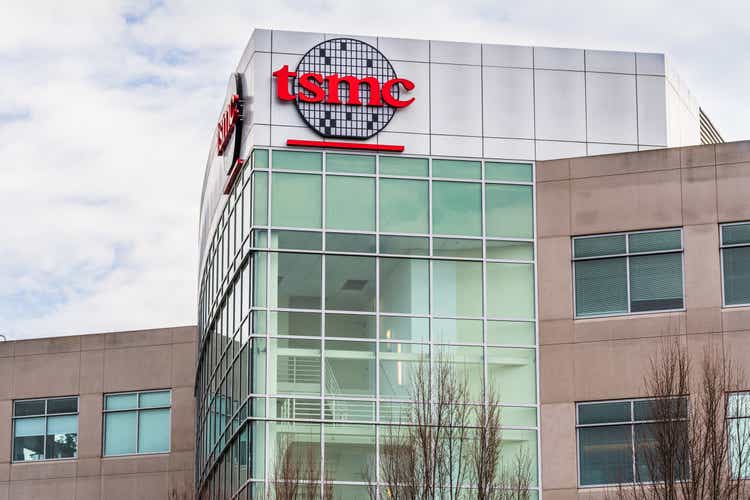
Sundry Photography
Taiwan Semiconductor’s (NYSE:TSM) stock soared about 13% on Thursday after third-quarter results and guidance beat estimates, drawing positive reactions from Wall Street.
Several chip stocks were in the green following TSM’s upbeat performance. Nvidia (NVDA) +3%, Qualcomm (QCOM) +2%, Broadcom (AVGO) +4%, AMD (AMD) and Intel (INTC) +1%, each, Micron Technology (MU) +3%.
Needham kept Buy rating and $210 price target on the stock.
“TSMC reported a blowout quarter with revenue, gross margin, and operating margin results and guidance that well exceeded consensus estimates,” said analysts led by Charles Shi.
Taiwan Semi now expects 2024 CapEx to be slightly higher than $30B and even higher in 2025. However, to the analysts this seems to be $1B trim to this year’s CapEx budget.
The analysts said that due to relatively downbeat quarterly CapEx numbers for the first three quarters of the year (at around $6B per quarter), the CapEx guidance implies that in the fourth quarter of 2024 it will almost double and reach about $12B, likely driven by the initial N2 buildout.
TSM’s 3nm process technology contributed 20% of total wafer revenue, while the 5nm process tech accounted for 32% of total wafer revenue.
The analysts said that by node, relative to Needham’s estimates, TSM’s third quarter results show much stronger performance of N3 and slightly weaker performance of N5. The analysts think the N3 upside should be mainly driven by Apple, while N5 revenue seems to be leveling off after six consecutive quarters of strong sequential growth.
Chairman and CEO C.C. Wei said on the company’s earnings call that revenue contribution from server AI processors will more than triple this year and account for a mid-teens percentage of total revenue in 2024.
Based on TSM’s management’s commentary, the analysts estimate that the company’s AI revenue was around $4B last year, and will likely reach $13B this year.
TSM has guided AI to account for 20% of the total revenue by 2028, which would result in around over $33B if the 15%+ total revenue CAGR continues through the next four years, according to the analysts.
Shi and his team said that TSM’s reported revenue split between technology nodes suggests that the non-wafer revenue, the majority of which comes from packaging, saw a meaningful step-up to $3.2B in the third quarter of 2024 from $2.4B in the second quarter of 2024, a 36% increase.
This could be partially driven by Apple’s ramp that drives InFO revenue, but the magnitude of the sequential growth appears to be above seasonality (around 20% quarter-over-quarter) and does support the rumor that TSM may have released 60% to 80% more Chip on Wafer on Substrate, or CoWoS, capacity in the third quarter of 2024.
BofA also maintained a Buy rating on TSM’s stock.
The analysts raised the price target on the stock to NT$1,400 (35% upside potential) to reflect the company’s strong third quarter results and fourth quarter guidance, better AI strength, and solid industry leadership.
The sustained 2024 capex and upbeat tone on 2025 capex further support this outlook, the analysts added.
The analysts noted that the upbeat fourth quarter guidance has strengthened their confidence in future growth.
Valuation remains attractive helped by advances in Al, including Nvidia’s (NVDA) Blackwell’s ramp-up, improved N3 yields, rising demand for advanced nodes, average selling price hikes, and market-share gains, all of which are set to drive structural earnings growth, according to the analysts.
The analysts added that they have reiterated the Buy rating despite recent demand concerns.
The demand outlook is positive, with strong Al demand marking the start of a long-term trend. Non-Al segments are stabilizing and recovering. PC and smartphone (around 45% to 50% revenue) are benefiting from faster silicon area growth, the analysts stated.
Beyond 2026, growth prospects remain robust, with high demand for N2, A16 technologies, and TSM’s tech leadership. The analysts expect competition to ease continuously. TSM sees sizable orders from the U.S. Integrated Device Manufacturers, or IDMs, still and shows no interest in acquiring fabs from the latter, the analysts added.
BofA sees limited risk of anti-trust issues, as the company holds only about 30% industry share under the foundry 2.0 Total addressable market, or TAM, and its market behavior does not fit the criteria for antitrust concerns.
The slower ASML shipments could signal improved long-term foundry supply/demand, further strengthening TSM’s market position, according to the analysts.
